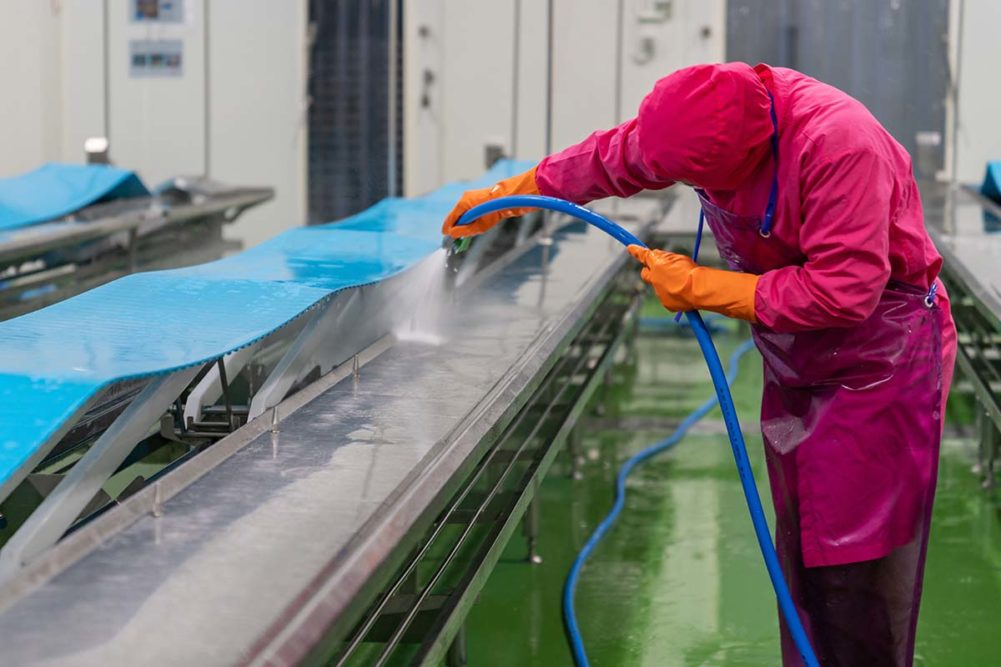Child labor allegations against Packers Sanitation Services Inc. (PSSI) sparked a jolt of chaos in the meat industry, as major US processors have had to rethink third-party sanitation services.
The Department of Labor (DOL) filed the findings of an investigation on PSSI’s possible employment of minors in November 2022, and the gravity of those claims continues to weigh on the industry to this day.
According to the DOL’s investigation, PSSI illegally employed at least 31 minors, from ages 13 to 17, to work in hazardous environments, such as cleaning equipment at meat processing facilities during overnight shifts.
PSSI responded to the claims at the time, saying, “While rogue individuals could of course seek to engage in fraud or identity theft, we are confident in our company’s strict compliance policies and will defend ourselves vigorously against these claims.”
The sanitation service provider has taken steps in the past year to act on these allegations. It has hired a new chief financial officer and has created a chief compliance officer position.
The company provided contract sanitation services, chemical innovations, pest prevention and other solutions at the time of the investigation for around 700 food processing facilities nationwide.
Among the affected processors, JBS USA quickly and collectedly responded to the state of affairs. A month after the allegations, JBS ended its cleaning contract with PSSI at its Grand Island, Neb., and Worthington, Minn., beef processing facilities. And, in less than eight months, the company created its own internal sanitation business unit, referred to as JBS Sanitation.
“The failures of third-party sanitation contractors to uphold our workforce eligibility, safety and compliance standards revealed in November 2022 was tragic and intolerable,” said Nikki Richardson, head of corporate communications at JBS USA. “In response, we took immediate, aggressive action.”
The full-service food safety and food plant sanitation business launched in May 2023, servicing 10 JBS USA and Pilgrim’s Pride facilities. Since its formation, JBS Sanitation has transitioned more than 30 production facilities from utilizing third-party services to using its in-house services.
Best practices
The new business leverages the success of its South American counterpart, JBS Brazil Sanitation, drawing from its global footprint and best practices that have been built up through 20-plus years of operations.
The template set forth from JBS Brazil Sanitation supported the immediacy and effectiveness required by the new North American business unit.
However, there was one structural element the Brazilian sanitation service could not prescribe, and that was the personnel to staff JBS Sanitation.
Comprising the in-house sanitation service is a unionized workforce of 1,000 internal team members. JBS Sanitation partnered with the United Food and Commercial Workers International Union (UFCW) to provide competitive wages and benefits for team members.
“The greatest challenge JBS Sanitation initially faced was finding the qualified and experienced personnel required to operate this new portion of the business,” Richardson said. “That said, our plants have strong and established leadership in the areas of operations, safety, engineering and food safety that has been able to offset or alleviate many of the challenges that would normally exist with a new business.”
Wilson Herrera was appointed president of JBS Sanitation. Since 2006, Herrera has held various leadership positions at JBS. He joins JBS Sanitation from JBS USA Pork, where he served as head of human resources.
JBS Global Head of Food Safety and Quality Assurance Alfred “Al” Almanza serves as the head of technical services for the new sanitation business unit. Before his tenure at JBS, Almanza spent nearly 40 years with the US Department of Agriculture, where he addressed issues of food safety, regulatory affairs and public health.
“Sanitation is a key component to producing safe, affordable, healthy food,” Almanza said. “It requires specific expertise and extensive training to be done safely. Our focus at JBS Sanitation will be the safety of the food we provide, the safety of the men and women who provide sanitation services and creating opportunities for our team members.”
 Alfred “Al” Almanza serves as the head of technical services for the new JBS sanitation business unit (Source: USDA Photo by Lance Cheung)
Alfred “Al” Almanza serves as the head of technical services for the new JBS sanitation business unit (Source: USDA Photo by Lance Cheung)Raising the bar
Following the allegations against PSSI, JBS looked to strengthen its oversight of contractors. The processor began by investigating the practices and compliance of all its sanitation providers.
“The initial steps we took last year included conducting a third-party audit of sanitation providers and their workforces at every facility, adding new age verification requirements and visual checks for those appearing under 30 years old, enhancing our security protocols, engaging third-party experts, and conducting a third-party internal investigation to ensure no JBS employees had any role in this situation,” Richardson said.
Additionally, the company implemented new positions to safeguard against risks and non-compliance.
JBS hired a new director of security to enhance security procedures, such as conducting on-site risk assessments, strengthening facility access procedures and providing general centralized security oversight.
Sanitation managers were assigned to each facility to ensure that the company’s policies and procedures regarding third-party sanitation vendors were followed at all times. A head of contractor compliance was also named.
“Even though sanitation is a new business for the company, it is held to the same high standards as all of our business units,” Richardson said. “The fact that our plants already have established hiring and compliance teams makes things much more efficient as well.”
Furthering its efforts, JBS emphasized and encouraged the use of an internal compliance hotline, where employees, community members, contractors, customers and suppliers can confidentially report suspicious activity.
JBS spread awareness of the issue beyond its walls, reaching out to local schools and communities. The company addressed any concerns they had and opened a channel of communication, informing the public of its compliance hotline.
“The creation of JBS Sanitation and our proven track record of moving sanitation in-house sends a clear message to third-party providers that non-compliance is not an option,” Richardson said. “We will not hesitate to transition additional facilities if third-party contractors cannot meet our high standards for compliance and service.”
Other processors are following suit. Producer-owned Triumph Foods announced in December 2023 that it is expanding its workforce in St. Joseph, Mo., with the addition of an in-house sanitation service. The addition will grow its workforce by 88 team members.
Like JBS, the pork processor collaborated with a worker union, UFCW Local 2, in the creation of the new jobs.
“Triumph Foods took a leadership position in the industry by collaborating with our union to create new unionized sanitation jobs,” said Martin Rosas, president of UFCW Local 2.
“This expansion will keep our sanitation practices in-house, with valued team members from our local community who are qualified and trained in safety,” said Matt England, president and chief executive officer of Triumph Foods.
Triumph Foods and JBS’s proactive initiatives to right the wrongs purported in the industry do not erase the severity of such allegations; however, it paves the way for a renewed beginning guided by impeccable standards.



